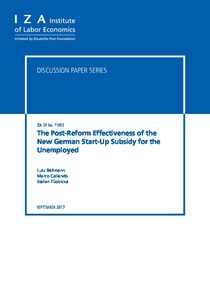The post-reform effectiveness of the new German start-up subsidy for the unemployed
"Start-up subsidies for the unemployed have long been an important active labor market policy strategy in Germany. The current subsidy program underwent a major reform in 2011 that changed its key parameters: support was lowered, eligibility criteria were tightened and entitlement was abandoned...
| Main Authors: | , , |
|---|---|
| Institution: | ETUI-European Trade Union Institute |
| Format: | TEXT |
| Language: | English |
| Published: |
Bonn
2017
IZA |
| Subjects: | |
| Online Access: | https://www.labourline.org/KENTIKA-19395543124911137259-The-post-reform-effectiveness-.htm |
| _version_ | 1771659893798862850 |
|---|---|
| author | Bellmann, Lutz Caliendo, Marco Tübbicke, Stefan |
| author_facet | Bellmann, Lutz Caliendo, Marco Tübbicke, Stefan |
| collection | Library items |
| description | "Start-up subsidies for the unemployed have long been an important active labor market policy strategy in Germany. The current subsidy program underwent a major reform in 2011 that changed its key parameters: support was lowered, eligibility criteria were tightened and entitlement was abandoned by granting caseworkers the right to reject applications. Ex-ante predictions on the post-reform effectiveness of the program are ambiguous, and knowledge about the importance of institutional details of such a program is very limited, making a new evaluation necessary. In our descriptive analysis, we compare personal and business characteristics of participants before and after the reform and we find significant differences in terms of gender composition, educational attainment and industry-specific experience. Post-reform participants also perform better in terms of subsequent labor market integration and show signs of higher commitment. These findings give us some indication for interpreting our estimates of causal effects of the post-reform program. We find that for both men and women, employment and income effects of the post-reform program are positive, sizable, and larger than what was estimated for the pre-reform program. All in all, the programs effectiveness seems to have improved through the reform. Potential reasons for this are discussed and include better screening of participants by caseworkers, higher rates of commitment and changes in macroeconomic conditions." |
| format | TEXT |
| geographic | Germany |
| id | 19395543124911137259_9114c163106e4a7ab0f8c019535fed16 |
| institution | ETUI-European Trade Union Institute |
| is_hierarchy_id | 19395543124911137259_9114c163106e4a7ab0f8c019535fed16 |
| is_hierarchy_title | The post-reform effectiveness of the new German start-up subsidy for the unemployed |
| language | English |
| physical | 35 p. Digital |
| publishDate | 2017 |
| publisher | Bonn IZA |
| spellingShingle | Bellmann, Lutz Caliendo, Marco Tübbicke, Stefan labour market policy subsidy enterprise creation SME The post-reform effectiveness of the new German start-up subsidy for the unemployed |
| thumbnail | https://www.labourline.org/Image_prev.jpg?Archive=131151395933 |
| title | The post-reform effectiveness of the new German start-up subsidy for the unemployed |
| topic | labour market policy subsidy enterprise creation SME |
| url | https://www.labourline.org/KENTIKA-19395543124911137259-The-post-reform-effectiveness-.htm |

